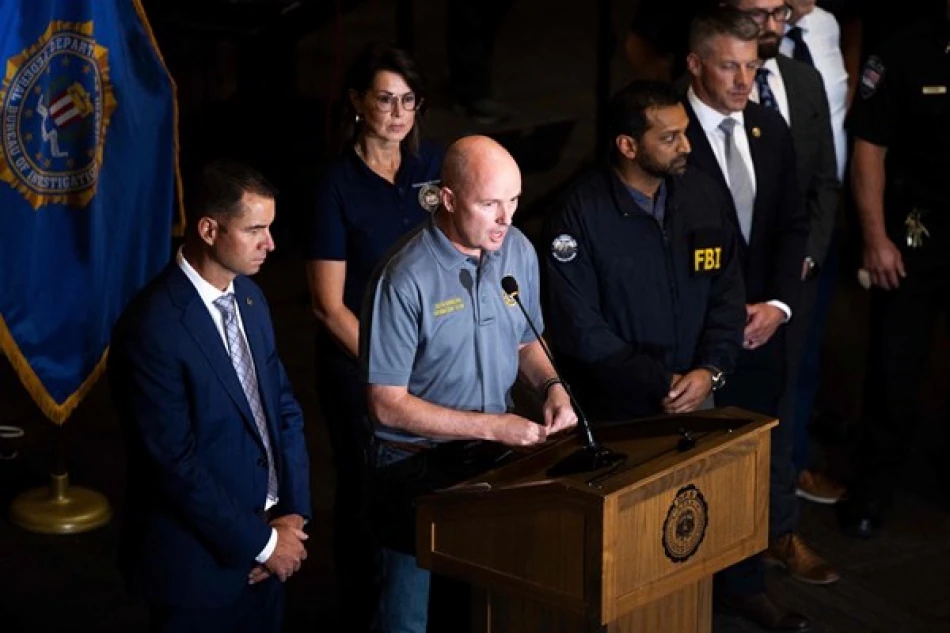
Latest Developments in the Assassination of Charlie Kirk, a Prominent American Activist
FBI Manhunt Intensifies as Charlie Kirk's Assassin Remains at Large
The assassination of conservative activist Charlie Kirk at Utah Valley University has triggered one of the most high-profile federal manhunts in recent years, with the FBI offering a $100,000 reward and President Trump promising the nation's highest civilian honor posthumously. Despite releasing surveillance footage and images of a person of interest, investigators have yet to apprehend the gunman who killed Kirk with a single shot on Wednesday.
Federal Resources Mobilized in Utah Campus Shooting
The investigation has drawn unprecedented federal attention, with FBI Director Kash Patel joining Utah Governor Spencer Cox at a press conference to appeal for public assistance. The suspect, partially concealed by a dark baseball cap and sunglasses, remains officially classified as a "person of interest" rather than a suspect, though authorities confirm his presence at the crime scene in Orem, Utah.
The $100,000 FBI reward represents a significant federal commitment typically reserved for cases involving domestic terrorism or threats to national security. This level of response suggests authorities may be treating Kirk's assassination as more than an isolated incident of campus violence.
Political Ramifications Immediate and Far-Reaching
Vice President J.D. Vance canceled his scheduled New York trip to personally escort Kirk's family and remains to Arizona aboard Air Force Two, underscoring the political significance of the killing. Trump's decision to award Kirk the Presidential Medal of Freedom posthumously elevates the conservative activist to the same honor roll as figures like Rosa Parks and John F. Kennedy.
"Charlie Kirk was a great person and a great man, great at everything, especially with young people," Trump told reporters, emphasizing Kirk's influence on conservative youth movements.
Campus Security Under Scrutiny
The brazen nature of the attack—a single gunshot on a university campus—raises serious questions about security protocols at American universities. Utah Valley University, like many institutions, has grappled with balancing open campus policies with security concerns in an era of increasing political polarization.
Kirk's prominent role in conservative student organizing made him a recognizable figure on college campuses nationwide, where his Turning Point USA organization has been both celebrated and protested. The targeted nature of the attack suggests this was not a random act of campus violence but a calculated assassination.
Investigation Challenges and Digital Evidence
The partial concealment of the suspect's identity, combined with the precision of the attack, indicates potential premeditation and planning. Modern university campuses are typically saturated with surveillance systems, yet the perpetrator's ability to evade immediate capture suggests either sophisticated operational security or intimate knowledge of the campus layout.
Federal investigators are likely analyzing digital footprints, social media activity, and communication patterns to build a profile of potential suspects. The classification as a "person of interest" rather than suspect may indicate authorities are still building their evidentiary case or protecting ongoing investigative techniques.
Broader Implications for Political Discourse
Kirk's assassination represents a dangerous escalation in America's polarized political environment. As founder of Turning Point USA, Kirk was instrumental in mobilizing conservative students and young voters, making him both influential and controversial on university campuses traditionally dominated by liberal perspectives.
The federal government's robust response—including presidential involvement and substantial reward money—signals determination to prevent this incident from inspiring copycat attacks against political figures. However, it also highlights the vulnerability of public figures in an increasingly fractured political landscape where campus events routinely generate intense opposition.
Most Viewed News

 Layla Al Mansoori
Layla Al Mansoori






